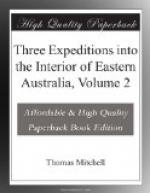HEAVY RAINS SET IN.
June 14.
The morning dawned under the most steady fall of rain that I had seen during the journey; and this happened just after new moon, a time when I had hoped for a favourable change in the weather. Everything was got across the river this day, and we were prepared for the survey of a new region. I was occupied with the maps of the country which we had just left sufficiently to be regardless of the rain, even if it had continued to fall many days; and very thankful was I that we had got thus far without having been impeded by the weather.
June 15.
The rain ceased in the morning and the barometer had risen so much that no more was to be apprehended then; yet the blacksmith had still some work to do to the boat-carriage, and we were therefore obliged to halt another day.
ROW UP THE MURRAY TO THE JUNCTION OF THE MURRUMBIDGEE.
In the afternoon I proceeded in one of the boats up the river to the junction of the Murrumbidgee; and I ascertained that there was a fresh in that river also. It was certainly narrower at the mouth than at Weyeba; and here indeed some fallen trees almost crossed the stream. There was a hollow or break in the bank of the Murray, about 100 yards lower down, which seemed to have been once an outlet of the Murrumbidgee. The opening formed a deep section through a stratum of ferruginous sandstone, and was fully equal to the present breadth of the tributary river. On pulling higher up, the Murray seemed rather smaller above this junction, although still a splendid stream. The natives on this side told Piper that the Darling tribe from the other had danced a corrobory with them about six weeks before, and promised to return in one moon. They also inquired whether Piper had seen any of that tribe as they were waiting for us whitefellows, to which Piper answered that he had NOT. I blamed him for this reply, and asked why he did not say that we had been obliged to fire upon and kill some of them: but he said he could not tell them that, because they would hate him so.
COMMENCE THE JOURNEY UPWARDS, ALONG THE LEFT BANK.
June 16.
We left our encampment and commenced our travels up the left bank of the Murray over ground which seemed much better than any we had seen on the right bank. We crossed grassy plains bounded by sandhills on which grew pines (callitris); and open forests of goborro (or box-tree) prevailed very generally nearer the river. Where this tree grew we found the ground still good for travelling upon, notwithstanding the heavy rain, in consequence apparently of the argillaceous character of the soil; for in the plains of red earth, which before the last fall of rain we had found the best, the horses now sank above their fetlocks and the carts could scarcely be dragged along. In the course of the day we passed several broad lagoons in channels which probably were ana-branches of the river in high floods. On the largest plain crossed by the party four emus appeared, and one of them was killed after a fine chase by the dogs. The river appeared to come from the east-south-east but the course was very tortuous, and we encamped at a reach where it seemed to come from the south.




